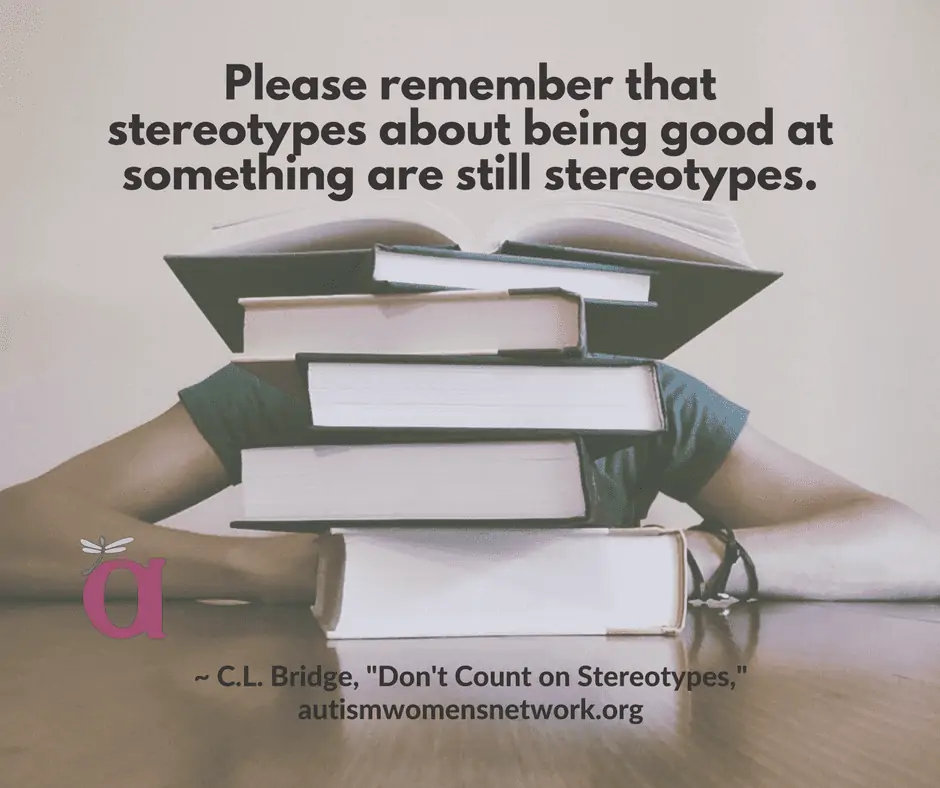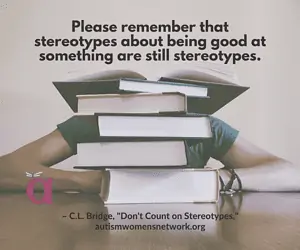
Don’t Count on Stereotypes
At age sixteen, I sat in the backseat of my parents’ car, doing sums in my head. I pictured the numbers being written out on the back of the seat in front of me. Why was I doing arithmetic when I would rather daydream? Because I thought that “real” autistic people would amuse themselves by doing math in their heads, and I was trying to find out if I were “really” autistic.
I doubted my autism diagnosis when I was younger because I never fit the stereotype of the emotionally detached person who solves equations for fun but doesn’t care for poetry or fiction. In the middle of

Image is a person seated at a table, mostly obscured by a tall stack of books. Text says, “Please remember that stereotypes about being good at something are still stereotypes. ~ C.L. Bridge, “Don’t Count on Stereotypes,” awnnetwork.org
eleventh grade, I was finally starting to grasp algebra after failing at it for several years. Literature was my favorite high school subject.
When it was time to take the ACT and get ready for college, I studied really hard. I was determined to do well in every subject so teachers would not underestimate me. I studied especially hard in math, not only to live up to the “autistic math genius” stereotype but also to dispel other stereotypes I’d faced. When I was a child, some teachers did not believe my math struggles were real because I was in the gifted program. They thought I was just not trying hard enough. Even more frustratingly, when I was a teenager, people told me I was bad at math because I was a girl. These colliding stereotypes made my life very confusing.
After seeing my test scores, my first community college advisor insisted I take pre-calculus. He said he wanted to show me what I was capable of. I hadn’t chosen a major, and did not have the self-awareness or confidence to say, “I don’t really like math and would rather just take basic algebra.”
I hated every minute of that pre-calculus class. Learning math by listening to words is very difficult for me, so I didn’t gain much from the lectures. (It’s a good thing the professor liked to end class early.) I finished with an A, but that’s probably because I repeated the online practice problems six days a week and only had one other class that semester. My perfectionism made the class even more stressful than it otherwise would have been. Because I thought my academic achievements were the only thing that made up for my social difficulties, I had a huge tearful meltdown when I made a B on my first test.
Later came General Chemistry 1, the most difficult—and boring—class I have ever taken. The labs were okay except for the wordy instructions I could never quite remember. The lectures were mind-numbing, though. I tried to focus, certain that the hour was almost up. Then I would look at a clock and realize it had only been twenty minutes. Even with tutoring, I struggled. Yet I continued to General Chemistry 2, because whenever I talked to academic advisors—even wonderful, caring advisors whom I had a good relationship with—they mentioned my grades and test scores and told me I should be an engineer or scientist. Some even talked about me finding cures for diseases. These expectations put a lot of pressure on me.
I remained undeclared throughout community college. Why did I feel so stuck? After all, people kept telling me I could do anything I wanted to…almost anything. I had a fourth stereotype to deal with, the stereotype of the starving artist. Whenever I mentioned my interest in art and design, I was told that art was just a hobby, and that if I majored in it, I would end up unemployed. This even happened when I came home from touring a university’s interior design department, feverishly excited that making spaces sensory-friendly was an actual job. My mother called interior design “unimportant” so many times that I reluctantly dropped the idea.
Not until I transferred to a university, with new people who had no preconceived ideas of me, did I start to understand myself better. At first, I declared an environmental biology major and art minor because I knew I liked exploring nature and making things. Gradually, I realized I was too interested in art to relegate it to a minor, and ended up switching to an art major and biology minor. I’m still unsure exactly what I want for my future, but I hope to one day study abroad and earn an MFA. Until then, I’m making art and enjoying my job at a public library…and I’m relieved that I’m no longer pressured to cure cancer.
No autistic person should feel the need to do sums in their head to “prove” their autism to themselves. No person of any neurotype should feel that they must overachieve to compensate for their challenges, or that excelling at a certain subject is the only way they can be valuable. Please remember that stereotypes about being good at something are still stereotypes. They can make people feel bad for not being able to live up to them. The “autistic math genius” stereotype may seem better than “gifted kids who struggle in school are just lazy” or “girls can’t do math” or “art majors don’t get jobs”, but it can limit a person’s future just as much as those more negative stereotypes can—especially when it is combined with them.
About the writer, C.L. Bridge

Thanks for the personal disclosure clearly illustrating how positive stereotypes can be just as limiting as negative ones. This is important to keep in mind, especially since negative stereotypes are often thought of as the “bad” ones to be conscious of. Rather than falling back on any stereotypes, listening with an open mind to other people is the only way to understand them from their own perspective. Your post underlines how this applies not only to fully appreciating other people but better understanding and honouring ourselves. To explore the evolving truth of others and ourselves with a beginner’s mind is the only form of ethical encounter that ensures stereotypes and stigma do not dominate our perceptions and block us from who we are. Growing up I was strong, healthy, and able to intellectualize anything. The image of being the strong independent smart one blocked me from letting others know how anxious and confused I really was and kept them from looking closer. Your post is very insightful and I wish I had read it years ago.
Gordon
It’s not a stereotype, it’s a common reality. It’s not universal, but is absolutely common. I study math in school and there are a disproportionate amount of people on the spectrum. It feels like home.
A big part of being 10, 11, 12 is starting to experiment with identity and roles. You trying on the hat of autistic math genius is not so different than the awkward attempts at fitting in that make middle school so agonizing for literally most people.
As for “girls aren’t good at math,” that’s completely different. That is designed to repress and shame. Noting that a lot of people with autism are mechanically and technically inclined is an understatement. It is a true statement that many people with autism are gifted in this way. It doesn’t make you less autistic, but it’s not a stereotype, either.